
How to keep cool and carry on in a heatwave
Temperatures could be the highest ever recorded in the UK this week, beating the current record temperature from 2019, when a high of 38.7C was recorded in Cambridge.
The Met Office has issued a red extreme heat warning for many parts of England, from London and the south-east up to York and Manchester.
Amber warnings are also currently in place across the rest of England, all of Wales, and parts of Scotland.
Do I have to work during a heatwave?
For those hoping to be given a day off, unfortunately, there are currently no laws in the UK about when it is too hot to work.
Employers should provide a "reasonable" temperature in the workplace.
But the Health and Safety Executive (HSE) says a limit cannot be introduced because some industries have to work in high temperatures.
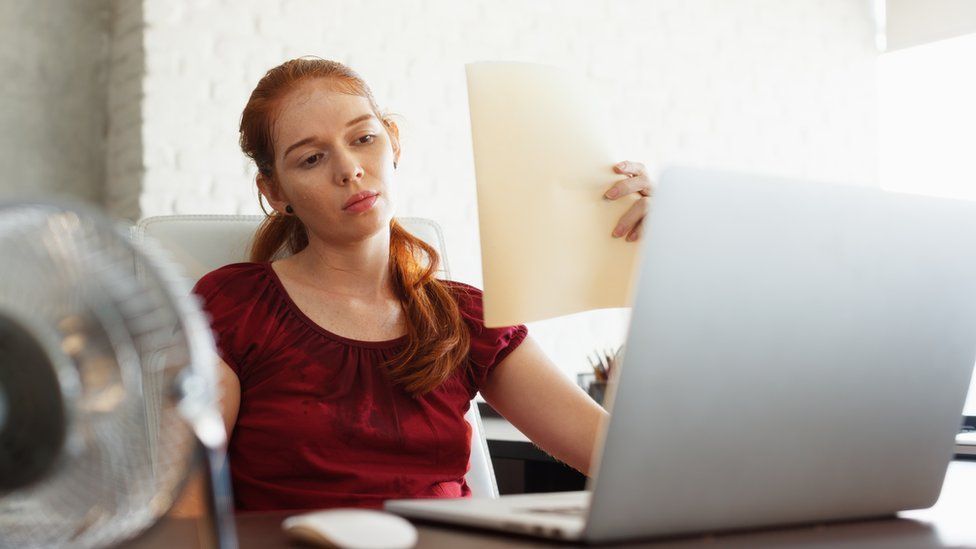
It can, however, be too cold to work. Government guidance recommends a minimum working temperature of 16C (61F), or 13C, if employees are doing physical work.
As avoiding work in the heat isn't an option, then there's the inevitable dilemma of what to wear.
But can you wear flip-flops to work? Staff should have a relaxed dress code during the heatwave, union says.
How do you sleep?
That's the million dollar question. On sticky nights, drifting off can seem impossible.
A big part of the problem is humidity, which makes it hard for sweat to evaporate.
To try and keep your bedroom as cool as possible, shut your blinds or curtains during the day - although doing so with metallic blinds and dark curtains could make the room hotter.
You could also open windows on the shady side of your home and close them on the sunny side - and then open all the windows before going to bed to get a thorough breeze.
That's not an option open to everyone, so an electric fan can be a handy substitute.
A fan will help move the air around your body and increase the chance of sweat evaporating.
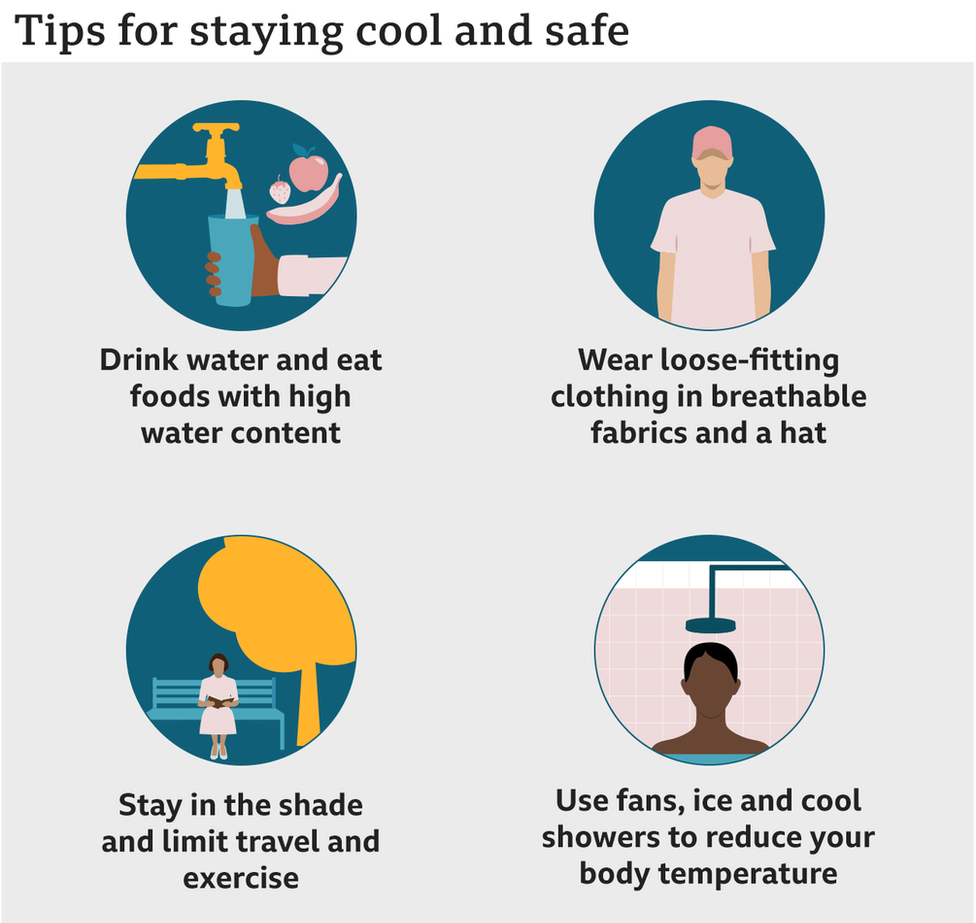
Other recommendations include:
* Putting reflective material or shades outside bedroom windows
* Having a lukewarm shower before bed
* Using thin cotton sheets
* Wearing lightweight materials for bed as they can keep you cooler - as can sleeping naked and avoiding sharing space with partners
* Putting your sheets in the freezer for a spell before you go to bed
When it comes to children, the NHS says a cool bath before bedtime can help.
Pyjamas and bedclothes should be kept to a minimum, and if a baby kicks off its bedcovers during the night then they could sleep in just a nappy - babies sleep most comfortably when their room is between 16C (61F) and 20C (68F).
How do you keep babies cool?
As if you don't have enough to think about with a baby, a heatwave brings an added risk of dehydration, sunburn and sunstroke.
The NHS recommends keeping all babies under six months out of direct sunlight, and older infants should be kept out of the sun as much as possible, particularly between 11:00 and 15:00.
They should be kept in the shade or under a sunshade if they're in a buggy or pushchair.
Sun cream with a high sun protection factor should be applied regularly - particularly if children are in water.
All children should be given plenty of fluids and the NHS says babies who are being breastfed may want to feed more than usual, but will not need water as well as breast milk.
If they are bottle feeding, babies can be given cooled boiled water as well as their usual milk feeds.
What should you wear?
Dressing for the weather may sound obvious, but clothes can make a real difference to how our bodies handle heat.
As tempting as it might be to strip off, you may be at greater risk of sunburn which can affect your body's ability to cool itself.
It's best to choose light colours over dark - which absorb heat more - and loose garments that can allow air to get in.
Hats with ventilation will also help and fabric choice is key - materials like cotton and linen are more breathable, absorbing sweat and encouraging ventilation.
Are heatwaves connected to climate change?
This is fast becoming the first question asked when extreme weather events strike - and the answer remains the same.
It is almost impossible to say that a specific event, like the current hot spell, is caused by global heating.
However there are some very strong connections to human-induced warming that increase the likelihood of such weather.
Last year's blazing summer in the UK was said by the Met Office to have been made 30 times more likely because of emissions from human activity.
And the Met Office also said warm spells in the UK have more than doubled in length - increasing from 5.3 days in the 1961-1990 period to more than 13 days in the decade from 2008 to 2017.
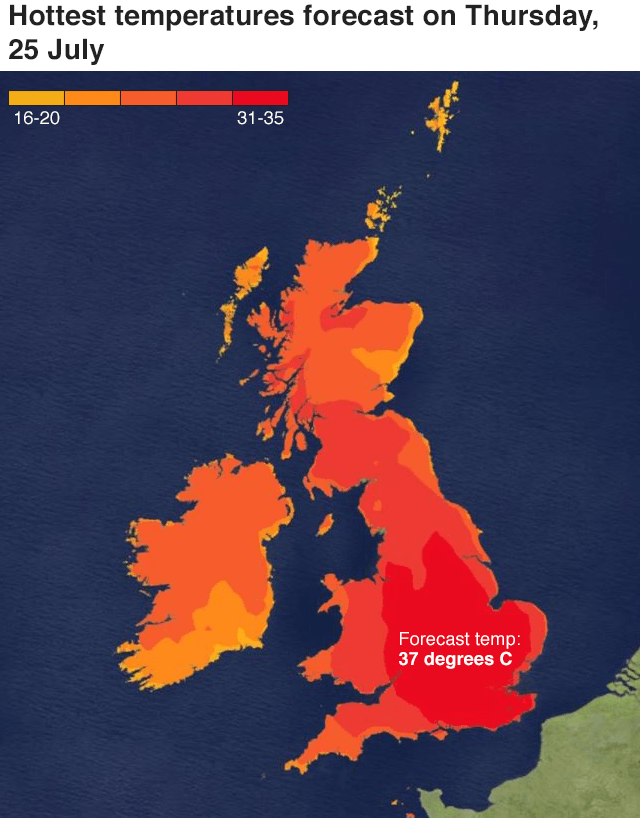
The heatwave also follows on from a previous record-breaking June across Europe, which was 1C above the long term trend and an incredible 3C above the average from 1850-1900.
When researchers carried out a rapid analysis to see the impact of climate change on the June heatwave, they concluded it was made at least five times more likely by warming.
It may well be that the current period of extremely hot weather is purely down to natural variability, said BBC environment correspondent Matt McGrath. But even if so, the fingerprints of fossil fuel burning are heavily influencing the background - and making such events much more likely.
Any advice on what to eat and drink?
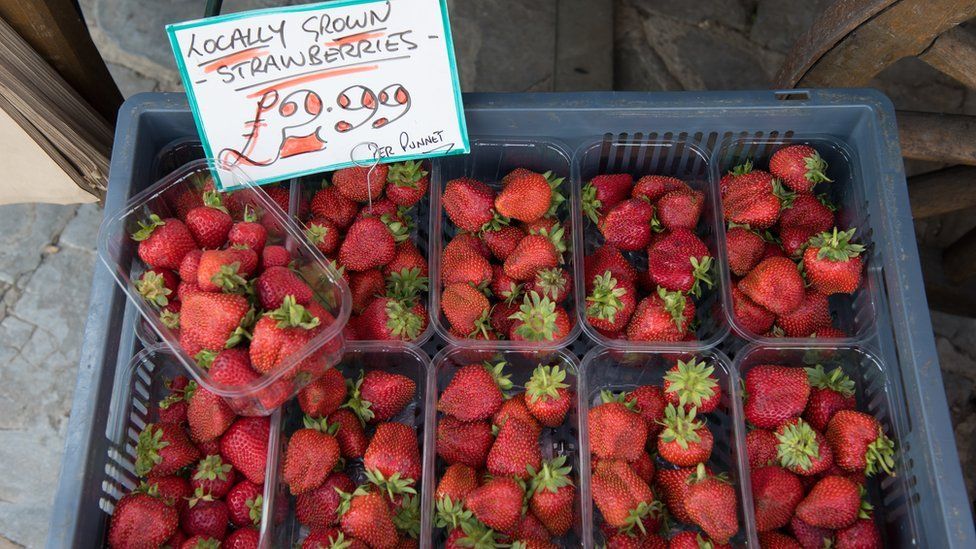 Strawberries are among the foods recommended during a heatwave
Strawberries are among the foods recommended during a heatwave
Hydration is key. Our bodies sweat more in hot weather, so it is really important to restock lost water levels.
Don't rely on your physical thirst to judge how dehydrated you are as it's not a very good indicator (urine colour is better), so you should try to drink plenty before you feel parched.
And try not to consume too much alcohol. The NHS says good drink options include water, lower-fat milks and tea and coffee.
Foods with high water content such as strawberries, cucumber, courgette, lettuce, celery and melon can also help you stay hydrated.
Try to avoid large, heavy meals laden with carbohydrates and protein because they take more digesting, which in turn produces more body heat.
Although it may not be what you fancy on sweaty days, scientific research suggests spicy and hot foods can actually help cool you down.
What about pets?
Dogs in particular struggle in the hot weather because they are not able to cool down through sweating, as humans do, and those breeds with long coats are especially prone to overheating.
The RSPCA has a series of tips for keeping animals safe and comfortable during the heatwave.
These include avoiding leaving animals in hot cars, conservatories, outbuildings or caravans, which, even just for a short while, can be fatal due to rising temperatures.
It also says it is best to walk a dog early in the morning or late in the evening when it is cooler, as paws can burn on a hot pavement. Exercise can also increase the risk of heatstroke.
For those pets kept in cages, hutches, fish tanks or other enclosures, they should be kept out of direct sunlight.
And it's not just humans who need sun cream, it might also be beneficial to apply some to your pet.
Animals' exposed spots, such as ears and noses, are vulnerable to sunburn and - just like people - sun damage can lead to skin cancer.
The Blue Cross say white cats are at a higher risk of developing skin cancer from sunlight exposure than others.
What are symptoms of heatstroke?
Most people in the UK aren't used to such extreme temperatures, which can cause heat exhaustion and, more seriously, heatstroke.
Signs of heat exhaustion can include tiredness or weakness, feeling faint or dizzy, having muscle cramps or feeling sick. If left untreated, the more serious symptoms of heatstroke can develop, including confusion, disorientation and even a loss of consciousness.
Those suffering the signs of heat exhaustion should go to a cool place with air conditioning or shade, use a cool, wet sponge or flannel and drink fluids - ideally water, fruit juice or a rehydration drink, such as a sports drink.
Those most vulnerable include the elderly, people with conditions such as diabetes, young children and people working or exercising outdoors.
Can I exercise during a heatwave?
If you choose to exercise, listen to your body - it will be under greater strain than in usual conditions so your usual limits may be different.
Aim to do it when the weather is at its coolest: early or late in the day.
If you do intensive exercise, drink lots of water. Isotonic sports drinks can also help ensure you are rehydrating properly.
Cold showers and blotting with damp, cold materials can also work wonders.
In general, stay in the shade or in air-conditioned places as much as possible, especially at the hottest part of the day.
How long does it take to burn?
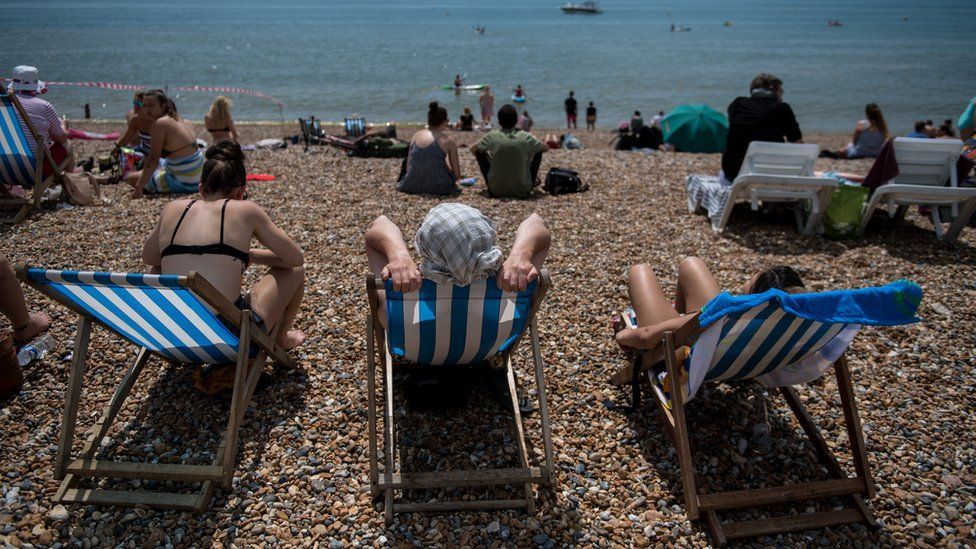
The risk of sunburn depends on how sensitive your skin is, and how strong the sun's ultraviolet (UV) rays are.
The UV index will vary, depending on where you are in the world, the time of year, what the weather is like, the time of day, and how high up you are compared to sea level.
During the UK's summer months, the sun's UV rays are strongest between 11:00 and 15:00.
Cancer Research UK suggests using a simple "shadow rule" to estimate the strength of the sun.
It suggests that if your shadow is shorter than your height, the sun's UV rays are strong - and you are therefore more likely to burn.
How often should you reapply sun cream?
There are lots of "extended wear" sunscreens on the market that advertise themselves as being for use "once a day", or claiming to last for eight hours.
But dermatologists recommend that these products should still be applied at least every two hours, like any other sunscreen, since the risk that you may have missed a spot - or that it will rub or wash off in that time - are too high.
The British Association of Dermatologists says sunscreen with SPF 30 is a "satisfactory form of sun protection in addition to protective shade and clothing" and that it should be reapplied at least every two hours, no matter what SPF it is.
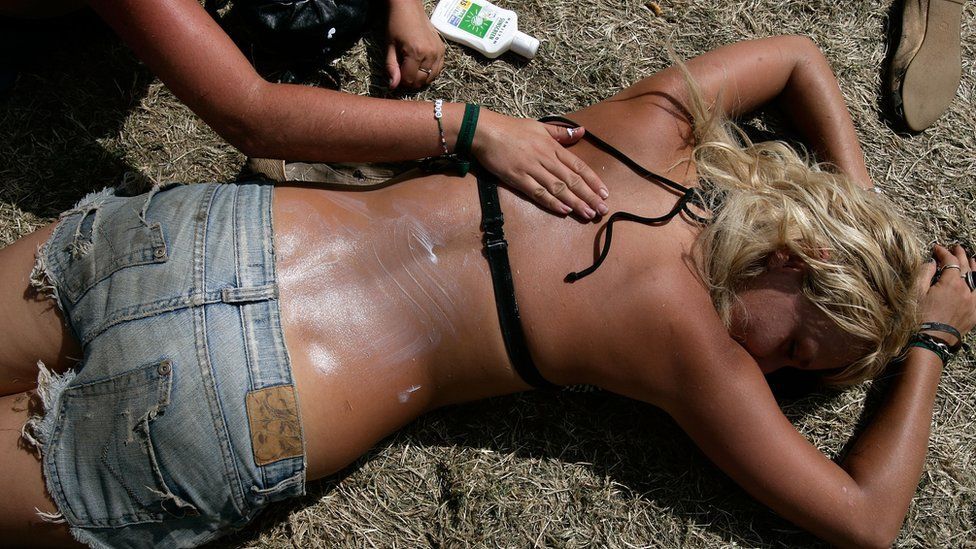
However, the British Association of Dermatologists (BAD) says in general you should look for two ratings on bottles of sun creams.
The sun emits two types of ultraviolet rays - UVA (most commonly responsible for premature ageing and wrinkles) and UVB (which causes most sunburn).
The BAD says you need to be protected from both.
The sun protection factor (SPF) offers guidance on a cream's protection against UVB rays, while a star system indicates the level of protection against UVA rays.
Five ways to keep your dog cool this summer
Dog owners have been urged to check pavements using the "seven-second test"











